|
|
|
Sort Order |
|
|
|
Items / Page
|
|
|
|
|
|
|
| Srl | Item |
| 1 |
ID:
118204
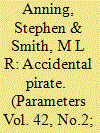

|
|
|
| 2 |
ID:
075179
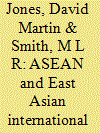

|
|
|
|
|
| Publication |
Cheltenham, Edward Elgar, 2006.
|
| Description |
xi, 269p.Hbk
|
| Standard Number |
1843764911
|
|
|
|
|
|
|
|
|
|
|
|
Copies: C:1/I:0,R:0,Q:0
Circulation
| Accession# | Call# | Current Location | Status | Policy | Location |
| 051960 | 909.09823083/JON 051960 | Main | On Shelf | General | |
|
|
|
|
| 3 |
ID:
095295
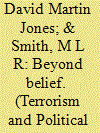

|
|
|
|
|
| Publication |
2010.
|
| Summary/Abstract |
The development of radical Islamist strategic thinking and the impact of post-modern, Western styles of thought upon the ideology that informs that strategy is often overlooked in conventional discussions of homegrown threats from jihadist militants. The propensity to discount the ideology informing both al-Qaeda and nominally non-violent Islamist movements with an analogous political philosophy like Hizb ut-Tahrir neglects the influence that critical Western modes of thought exercise upon their strategic thinking especially in the context of homegrown radicalization. Drawing selectively on non-liberal tendencies in the Western ideological canon has, in fact, endowed Khilaafaism (caliphism) with both a distinctive theoretical style and strategic practice. In particular, it derives intellectual sustenance from a post-Marxist Frankfurt School of critical thinking that in combination with an "English" School of international relations idealism holds that epistemological claims are socially determined, subjective, and serve the interests of dominant power relations. This critical, normative, and constructivist approach to international relations seeks not only to explain the historical emergence of the global order, but also to transcend it. This transformative agenda bears comparison with radical Islamist critiques of Western ontology and is of interest to Islamism's political and strategic thinking. In this regard, the relativist and critical approaches that have come to dominate the academic social sciences since the 1990s not only reflect a loss of faith in Western values in a way that undermines the prospects for a liberal and pluralist polity, but also, through a critical process facilitated by much international relations orthodoxy, promotes the strategic and ideological agenda of radical Islam. It is this curious strategic and ideological evolution that this paper explores.
|
|
|
|
|
|
|
|
|
|
|
|
|
|
|
|
| 4 |
ID:
121894
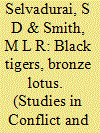

|
|
|
|
|
| Publication |
2013.
|
| Summary/Abstract |
Although much has been written on the Sri Lankan state's civil war with the Liberation Tigers of Tamil Eelam (LTTE), less has been said about how the conflict's dynamics evolved. How did the parties come to utilize the methods they did? Why did the war become so brutal, characterized by a predisposition toward extreme violence on both sides? Using the typology of "dirty war," this investigation seeks to address such questions, demonstrating how the strategic choices of the main belligerents shaped the conflict. The analysis shows that while the conflict emerged out of deep-rooted social and ethnic divisions, these factors do not account for how the war came to be defined so comprehensively by the methods of dirty war. It finds that dirty war developed from a sporadic tactic to advance political goals to dominant military practice by a reciprocal process of escalation that eventually internalized dirty war as the accepted mode of strategic communication.
|
|
|
|
|
|
|
|
|
|
|
|
|
|
|
|
| 5 |
ID:
193095
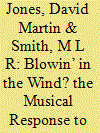

|
|
|
|
|
| Summary/Abstract |
Popular music was the most immediate way in which the cultural response to 9/11 manifested itself. Initially music offered a way of mourning and coping with grief. As the United States moved toward the invasion of Iraq, pop music also began to reflect the divisions in society between patriot-artists who supported the invasion, most notably in country music, and protest-artists who articulated critical attitudes to war. These anti-war songs did not attain the stature of those that characterized the era of protest during the Vietnam War, nor did they offer a musical accompaniment to a social movement with any enduring political significance. One little observed dissonance that a longitudinal survey of the musical response to political violence reveals, however, is that over time the attitudes of protest songwriters and the patriots transvalued. Ironically, interventionist “rednecks” became disillusioned with the endless wars of intervention, whilst the “protest” writers lost their voices after President Obama came to power. Ironically, icons of popular music instead turned their ire on those who voted for an anti-establishment President Trump who vowed not to involve the U.S. in further military adventures.
|
|
|
|
|
|
|
|
|
|
|
|
|
|
|
|
| 6 |
ID:
115009
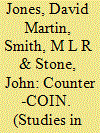

|
|
|
|
|
| Publication |
2012.
|
| Summary/Abstract |
The notion of "counterinsurgency" (COIN) has for some years been the central concept driving military operations in Afghanistan, and before that, in Iraq. It constitutes the dominant idea influencing much current military planning of the major Western powers. This study questions the assumptions and relevance of the thinking behind counterinsurgency doctrine. It suggests that the ultimate effect of its dominance is to reduce the highly contingent nature of war to a list of techniques, the application of which are regarded as a sufficient precondition whenever states deem that they are confronted by conflicts that can be described as an "insurgency." Such assumptions are both arbitrary and risk crowding out necessary, although by their nature very difficult, political judgments that are required for the effective construction and implementation of strategies that seek to ensure that the ends sought are proportional to the means employed.
|
|
|
|
|
|
|
|
|
|
|
|
|
|
|
|
| 7 |
ID:
057712
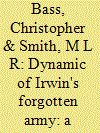

|
|
|
| 8 |
ID:
115215
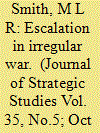

|
|
|
|
|
| Publication |
2012.
|
| Summary/Abstract |
If all violence is intended to achieve political effects, what is distinctive about escalation in irregular war? Indeed, what is irregular war? To answer such fundamental questions this analysis employs the principles of strategic theory in an attempt to offer a theoretical and practical framework that will facilitate an appreciation of the subsequent contributions to this special issue. The assessment seeks to articulate how the escalation process in conditions of so-called irregular war might be conceptualized and, via examples, illustrate how certain broad observations may be held to be true. Ultimately, though, the argument emphasizes that the process of escalation cannot be distinctive or follow predictable patterns given that all wars are unique to their time and place and will be affected in their conduct by the contingent forces of passion, chance and reason.
|
|
|
|
|
|
|
|
|
|
|
|
|
|
|
|
| 9 |
ID:
047158
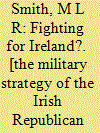

|
|
|
|
|
| Publication |
London, Routledge, 1995.
|
| Description |
xxvii, 265p.Pbk
|
| Standard Number |
041516334X
|
|
|
|
|
|
|
|
|
|
|
|
Copies: C:1/I:0,R:0,Q:0
Circulation
| Accession# | Call# | Current Location | Status | Policy | Location |
| 044653 | 941.60824/SMI 044653 | Main | On Shelf | General | |
|
|
|
|
| 10 |
ID:
096545
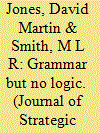

|
|
|
| 11 |
ID:
066018
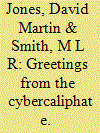

|
|
|
| 12 |
ID:
113269


|
|
|
|
|
| Publication |
2012.
|
| Summary/Abstract |
Despite an increasing number of attacks by violent anti-Good Friday Agreement (GFA) Republicans from 2009 there is still relatively little understanding of the nature of these organizations or the likely longevity of their campaign(s). This analysis argues that the current upsurge of violence is likely to continue for the foreseeable future, due to a combination of factors that entrench republican ideology. The fractured nature of anti-GFA groups and the declining stature of the Provisional movement are key factors that energize anti-agreement sentiment. In particular, this study identifies the Internet as one of the most significant emerging drivers in that it has the potential to sustain social networks that create and reinforce a traditional minded Irish Republican constituency implacably committed to using violence in pursuit of its goals.
|
|
|
|
|
|
|
|
|
|
|
|
|
|
|
|
| 13 |
ID:
061683
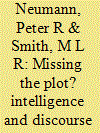

|
|
|
| 14 |
ID:
107885
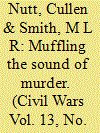

|
|
|
|
|
| Publication |
2011.
|
| Summary/Abstract |
Zimbabwe's military intervention in the Democratic Republic of the Congo between 1998 and 2002 has not been analysed in detail. Scholars have either taken the ruling Zimbabwe African National Union - Patriotic Front (ZANU-PF) regime at its word or been too distracted by Zimbabwe's domestic turmoil to cast a critical gaze on what must rank as one of Africa's most disastrous military interventions. This article addresses this lacuna by discussing three aspects of the intervention: Zimbabwe's motives; the military's performance in the Congo; and ZANU-PF's efforts to obscure the reality of the intervention from the Zimbabwean public. While Zimbabwe's motives were more nuanced than many scholars acknowledge, the military's performance in the conflict was an unmitigated failure borne of poor training and leadership, corruption, weak allies and poor strategic choices. At home the intervention wrought a generation of veterans infected with acquired immune deficiency syndrome (AIDS), a bankrupt exchequer and a military thoroughly depleted by an unnecessary war.
|
|
|
|
|
|
|
|
|
|
|
|
|
|
|
|
| 15 |
ID:
122220
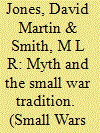

|
|
|
|
|
| Publication |
2013.
|
| Summary/Abstract |
In recent years a number of commentators have posited that the British reputation for conducting small wars has suffered in the wake of setbacks in Iraq and Afghanistan. The argument here contests whether such a tradition can be truly said to have ever existed. A close examination of this supposed tradition reveals it to be a myth. In fact, rarely have the British armed forces claimed a facility for counter-insurgency or small war. Invariably, commentators outside the Army have ascribed the tradition to them. Most notably, commentators in the United States keen to discern practices of minimum force or rapid institutional learning generated the narrative of British COIN expertise. Ultimately, what this myth reveals is that, when deconstructed, it is political will, not an ingrained understanding of fighting insurgencies, that has determined Britain's success, or otherwise, in so-called small wars.
|
|
|
|
|
|
|
|
|
|
|
|
|
|
|
|
| 16 |
ID:
144331
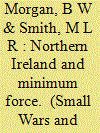

|
|
|
|
|
| Summary/Abstract |
The debate over whether there exists a British counter-insurgency tradition of minimum force is one that has been thoroughly discussed. Is there anything left to say? This study suggests there is further insight to be attained if one explicitly evaluates the concept of minimum force in relation to the conduct of the security forces in the years of the Northern Ireland conflict. Through an examination of three key periods in the conflict, it will be shown that while there was invariably an awareness of the need to act with restraint among senior officers at the strategic level, this was often difficult to apply at the tactical level in the heat of confrontation. The argument demonstrates that the British Army, and other instruments of the state, rarely acted in a manner that could be described as ‘minimal’. Instead, it was the broader liberal values of the British state that explains largely the degrees of restraint exhibited by the government and security forces.
|
|
|
|
|
|
|
|
|
|
|
|
|
|
|
|
| 17 |
ID:
158228
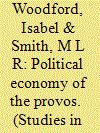

|
|
|
|
|
| Summary/Abstract |
Few academically rigorous accounts exist of the financial activities that sustained the rise of the Provisional Irish Republican Army (PIRA) during the Northern Ireland Troubles. Through a sustained methodology this study seeks to challenge some popular preconceptions and address omissions in the limited historical record. The article explores the organization's evolving financial sophistication by analyzing PIRA's acquisition of capital rather than its arms dealings. Using a new quantitative evaluation, this investigation confronts the prevailing understanding that Irish-American funds were of unrivaled significance to PIRA. It points to an array of domestic fund-raisers that collectively provided the overwhelming bulk of revenue. The study reveals also how PIRA developed an extensive reliance on criminal gangs for its expertise in illegal fund-raising, suggesting that moneymaking schemes were perceived as a necessary but unpopular by-product of the greater political objective. Finally, this article briefly explores how the British authorities sought to interdict PIRA's funding. While the general perception is that little was done to counteract PIRA's financing initiatives in the early phases of its violent campaign, this study, nevertheless, reveals that a subtle counterfinance initiative did take place in Belfast across the 1970s. Overall, the analysis enables a more rounded comprehension of the group's financial resilience.
|
|
|
|
|
|
|
|
|
|
|
|
|
|
|
|
| 18 |
ID:
141277
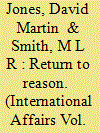

|
|
|
|
|
| Summary/Abstract |
Twenty-first-century political crises stretching from Europe to the Middle East and the Asia–Pacific have undermined the worldview that governed post-Cold War western thinking about a liberal end of history. This worldview assumed that shared norms and transnational institutions would transform the state based-order. In this context, the use of force is considered appropriate only for humanitarian ends meeting a set of predetermined axioms laid down in chapter 7 of the UN Charter. Yet for any strategy to be effective—in an international order subject to change—a clear political aim is required, which might deviate from the general rule. Preoccupied with universal postulates, legal normativism has lost sight of the particular. The argument put forth in this article is that the failure of contemporary western foreign policy in the twenty-first century to address this limitation or to prioritize political ends has led to strategic confusion from Afghanistan to Syria and Ukraine. In this context, it might be useful to reappraise the utility of abstract rationalist approaches to global governance and return instead to an earlier understanding of statecraft that avoided premature generalizations and treated norms as maxims of prudence rather than axioms requiring universal application.
|
|
|
|
|
|
|
|
|
|
|
|
|
|
|
|
| 19 |
ID:
144862
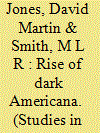

|
|
|
|
|
| Summary/Abstract |
In the wake of the 9/11 attacks the American film industry took a while to react to the Islamist threat at home and abroad. From 2005, however, Hollywood responded to the threat to the homeland and the War on Terror “over there” in Iraq and Afghanistan in a variety of ways. This article examines the nature of that response and whether it evinces, as critics allege, that the American film industry reflects and shapes a capitalist and imperialist agenda. More particularly, by evaluating the cinematic treatment of both the Iraq war and the problem of surveillance, rendition, and homeland security, the analysis explores what this distinctive on-screen genre tells about how the U.S. cultural mainstream has dealt with the challenge global jihadism poses to American values. The analysis suggests that post-9/11 movie making, while sometimes bleak and often clichéd, is cognizant of the gray area morality inherent in fighting the “War on Terror,” and is still thus able to offer some possibilities for sophisticated reflection.
|
|
|
|
|
|
|
|
|
|
|
|
|
|
|
|
| 20 |
ID:
193078
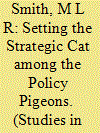

|
|
|
|
|
| Summary/Abstract |
In theory, the idea of strategy is easy to comprehend but in practice it is a hard taskmaster because it often involves calculations of political values that are rarely amenable to the kind of rationalistic application of “expert” opinion to which Western nations invariably default when considering overseas interventions. Based on remarks to the Oxford Changing Character of War Centre, this research note argues that foreign policy experts frequently find themselves out of touch with the sentiments of their own populations, which in part is responsible for the poor strategic outcomes that Western foreign policies have incurred in recent years. A number of remedies are suggested, based principally on returning Western policy making to a tradition of prudential realism.
|
|
|
|
|
|
|
|
|
|
|
|
|
|
|
|
|
|
|
|
|